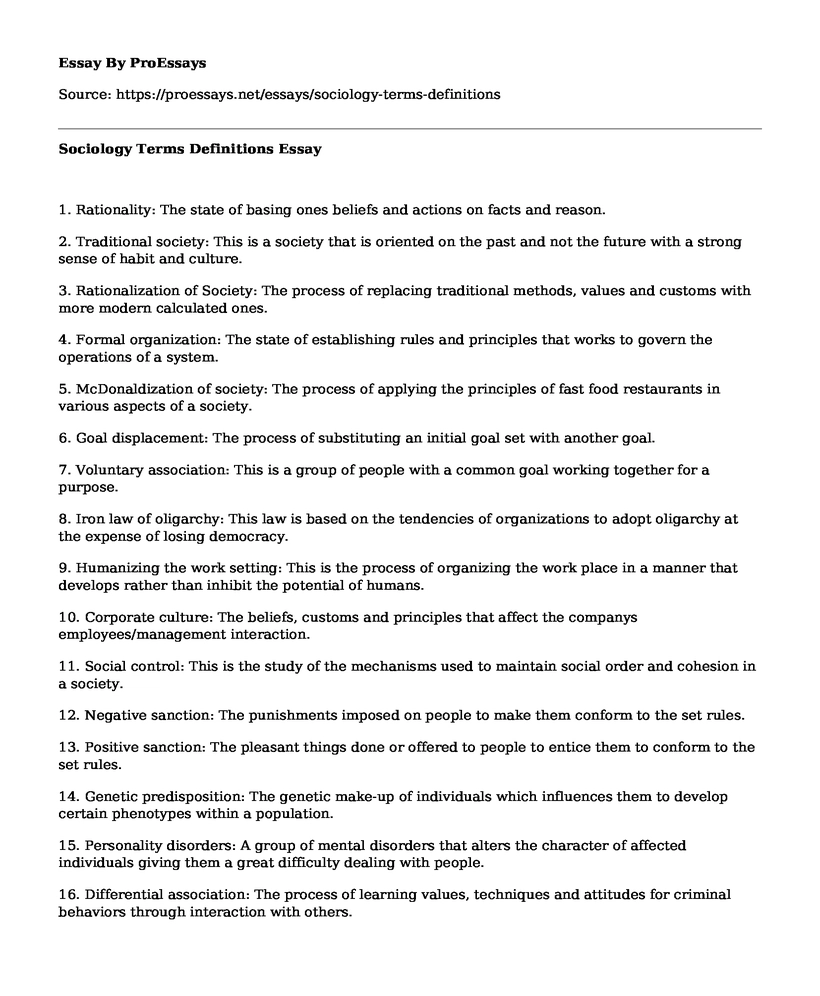1. Rationality: The state of basing ones beliefs and actions on facts and reason.
2. Traditional society: This is a society that is oriented on the past and not the future with a strong sense of habit and culture.
3. Rationalization of Society: The process of replacing traditional methods, values and customs with more modern calculated ones.
4. Formal organization: The state of establishing rules and principles that works to govern the operations of a system.
5. McDonaldization of society: The process of applying the principles of fast food restaurants in various aspects of a society.
6. Goal displacement: The process of substituting an initial goal set with another goal.
7. Voluntary association: This is a group of people with a common goal working together for a purpose.
8. Iron law of oligarchy: This law is based on the tendencies of organizations to adopt oligarchy at the expense of losing democracy.
9. Humanizing the work setting: This is the process of organizing the work place in a manner that develops rather than inhibit the potential of humans.
10. Corporate culture: The beliefs, customs and principles that affect the companys employees/management interaction.
11. Social control: This is the study of the mechanisms used to maintain social order and cohesion in a society.
12. Negative sanction: The punishments imposed on people to make them conform to the set rules.
13. Positive sanction: The pleasant things done or offered to people to entice them to conform to the set rules.
14. Genetic predisposition: The genetic make-up of individuals which influences them to develop certain phenotypes within a population.
15. Personality disorders: A group of mental disorders that alters the character of affected individuals giving them a great difficulty dealing with people.
16. Differential association: The process of learning values, techniques and attitudes for criminal behaviors through interaction with others.
17. Control theory: The idea that inner and outer controls work as guidelines preventing us from any form of deviation.
18. Degradation ceremony: A rite of passage of initiating people into institutions like prisons, military and mental hospitals.
19. Labeling theory: The process by which the character of an individual can be determined by the terms used to refer to them.
20. Techniques of neutralization: The methods that lead one into committing temporary illegitimate acts hence they compromise certain values they possess such as morality.
21. Recidivism rate: The frequency of people repeating a forbidden act even after experiencing negative consequences as a result of the same.
22. Social stratification: The categorizing of people in a society based on their socio-economic statuses.
23. Bonded labor (indentured service): The provision of services to a person you owe as a means of settling your debt.
24. Caste system: The system of grouping people according to their social ranks.
25. Estate stratification system: The system where estates were legally defined with each having rights and duties, privileges and obligations.
26. Class system: A system where people are categorized in groups according to their social classes.
27. Social Mobility: The change in social status of individuals or families within a given society.
28. Meritocracy: This is the form of leadership that is selected on the basis of intellectual capacity.
29. World System theory: The suggestion that in the world economic system some countries gain while others lose.
Cite this page
Sociology Terms Definitions. (2021, Mar 04). Retrieved from https://proessays.net/essays/sociology-terms-definitions
If you are the original author of this essay and no longer wish to have it published on the ProEssays website, please click below to request its removal:
- Paper Example on Nonverbal Communication in Native American's Culture
- Death and Dying Practices in Shintoism Essay Example
- Maya Lin and Chinese Heritage Essay
- Essay Sample on Social Networking
- Research Paper on Working Parents and Children
- Essay Example on High-Profile Career, Family Sacrifice: The Story of Anne Marie Slaughter
- Cultural Experience Field Report







